| Listing 1 - 9 of 9 |
Sort by
|
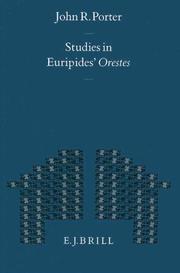
ISBN: 9004096620 9004329242 9789004096622 9789004329249 Year: 1994 Volume: 128 Publisher: Leiden ;New York E.J. Brill
Abstract | Keywords | Export | Availability | Bookmark
 Loading...
Loading...Choose an application
- Reference Manager
- EndNote
- RefWorks (Direct export to RefWorks)
This work challenges recent critical assessments that emphasize the allegedly subversive elements in Euripides' play. The Orestes is found to present a curious mélange of early and late Euripidean features, resulting in a drama where the tragic potential of Orestes' predicament becomes lost amid the moral, political and situational chaos that dominates the late Euripidean stage. Throughout, emphasis is placed on reading the Orestes in light of Greek stage conventions and the poet's own practice. Of particular interest are: an original examination, in light of Greek rhetorical practice, of Orestes' agon with Tyndareus; an analysis of the Phrygian's monody as a cunning hybrid of Timothean nome and traditional messenger speech; and a re-evaluation of the play's troubling deus ex machina.
Euripides --- Orestes (Greek mythology) --- Greek drama --- Oreste (Mythologie grecque) --- Théâtre grec --- Drama --- History and criticism --- Théâtre --- Histoire et critique --- Euripides. --- Orestes (Greek mythology) in literature. --- Orestes (Greek mythology) in literature --- Euripide --- Théâtre grec --- Théâtre --- Orestes, --- Literature. --- Belles-lettres --- Western literature (Western countries) --- World literature --- Authors --- Authorship --- Orest, --- Orestas, --- Oreste, --- Oresti, --- Oresto, --- Oresztész, --- Orestes (Euripides) --- Euripidis Orestes (Euripides) --- Philology
Book
ISBN: 9789004310902 9789004310919 9004310916 9004310908 Year: 2016 Volume: 390 Publisher: Leiden: Brill,
Abstract | Keywords | Export | Availability | Bookmark
 Loading...
Loading...Choose an application
- Reference Manager
- EndNote
- RefWorks (Direct export to RefWorks)
Despite the many studies of Greek comedy and tragedy separately, scholarship has generally neglected the relation of the two. And yet the genres developed together, were performed together, and influenced each other to the extent of becoming polar opposites. In Aristophanes and His Tragic Muse , Stephanie Nelson considers this opposition through an analysis of how the genres developed, by looking at the tragic and comic elements in satyr drama, and by contrasting specific Aristophanes plays with tragedies on similar themes, such as the individual, the polis, and the gods. The study reveals that tragedy’s focus on necessity and a quest for meaning complements a neglected but critical element in Athenian comedy: its interest in freedom, and the ambivalence of its incompatible visions of reality.
Aristophanes [Comicus] --- Greek drama --- Théâtre grec --- History and criticism. --- Histoire et critique --- Aristophanes --- Criticism and interpretation. --- Athens (Greece) --- Athènes (Grèce) --- In literature --- Dans la littérature --- History and criticism --- Criticism and interpretation --- Théâtre grec --- Athènes (Grèce) --- Dans la littérature --- In literature. --- Aristofan --- Arystofanes --- Aristophane --- Aristofane --- Arisutopanesu --- Arisutofanesu --- Aristófanes --- Aristophanes Comicus --- אריסטופאנוס --- אריסטופאנס --- אריסטופאנס. כספי זיוה --- אריסטופניס --- אריסטופנס --- Ἀριστοφάνης --- Greek drama - History and criticism --- Aristophanes - Criticism and interpretation
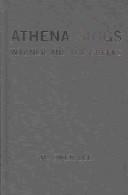
ISBN: 128199457X 9786611994570 1442671092 9781442671096 0802087957 0802085806 9780802087959 9780802085801 Year: 2019 Publisher: Toronto : University of Toronto Press,
Abstract | Keywords | Export | Availability | Bookmark
 Loading...
Loading...Choose an application
- Reference Manager
- EndNote
- RefWorks (Direct export to RefWorks)
Richard Wagner's knowledge of and passion for Greek drama was so profound that for Friedrich Nietzsche, Wagner was Aeschylus come alive again. Surprisingly little has been written about the pervasive influence of classical Greece on the quintessentially German master. In this elegant and masterfully argued book, renowned opera critic Father Owen Lee describes for the contemporary reader what it might have been like to witness a dramatic performance of Aeschylus in the theatre of Dionysus in Athens in the fifth century B.C. - something that Wagner himself undertook to do on several occasions, imagining a performance of The Oresteia in his mind, reading it aloud to his friends, providing his own commentary, and relating the Greek classic drama to his own romantic view. Father Lee also uses Wagner's writings on Greece and entries from his wife's diaries to cast new light on Tristan und Isolde, Die Meistersinger, Parsifal, and especially the mighty Ring cycle, where Wagner made extensive use of Greek elements to give structural unity and dramatic credibility to his Nordic and Germanic myths. No opera fan, argues Father Lee, can really understand Wagner saving Brünhilde without knowing the Athena who, in Greek drama, first brought justice to Athens.Written with a clarity and depth of knowledge that have characterized all Father Lee's books on the classics of Greece and Rome and made his six other volumes of opera bestsellers, Athena Sings traces the profound influence - an influence few music lovers are aware of - that Greek theatre and culture had on the most German of composers and his revolutionary musical dramas.
MUSIC --- Genres & Styles / Opera --- Greek drama --- Opera --- Appreciation --- Greek influences --- Wagner, Richard, --- Criticism and interpretation. --- Knowledge --- Greek drama. --- Wagner, Wilhelm Richard, --- Drach, Wilhelm, --- Fājner, Rītshārd, --- Vāgners, Richards, --- Vagner, Rikhard, --- Vagner, R. --- Wagner, R. --- Wagunā, R., --- Vagneri, Rihard, --- Wagner, Riccardo, --- ואגנר, ריכארד --- ואגנר, ריכרד, --- ואגנר, ריכארד, --- E-books --- Music --- Musique --- Critique et interprétation. --- Connaissance --- Drame grec. --- Drama --- Classical Greek literature --- Wagner, Richard --- Greek influences. --- Critique et interprétation. --- Et le théâtre grec.
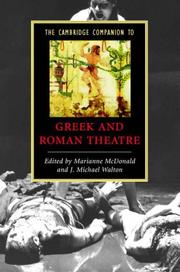
ISBN: 9780521834568 9780521542340 0521542340 0521834562 1139001507 1139817221 9781139001502 Year: 2007 Volume: *121 Publisher: Cambridge: Cambridge university press,
Abstract | Keywords | Export | Availability | Bookmark
 Loading...
Loading...Choose an application
- Reference Manager
- EndNote
- RefWorks (Direct export to RefWorks)
This series of essays by prominent academics and practitioners investigates in detail the history of performance in the classical Greek and Roman world. Beginning with the earliest examples of 'dramatic' presentation in the epic cycles and reaching through to the latter days of the Roman Empire and beyond, this 2007 Companion covers many aspects of these broad presentational societies. Dramatic performances that are text-based form only one part of cultures where presentation is a major element of all social and political life. Individual chapters range across a two thousand year timescale, and include specific chapters on acting traditions, masks, properties, playing places, festivals, religion and drama, comedy and society, and commodity, concluding with the dramatic legacy of myth and the modern media. The book addresses the needs of students of drama and classics, as well as anyone with an interest in the theatre's history and practice.
Theater --- Greek drama --- Latin drama --- Théâtre --- Théâtre grec --- Théâtre latin --- History --- History and criticism. --- Histoire --- Histoire et critique --- History and criticism --- Théâtre --- Théâtre grec --- Théâtre latin --- Classical Latin literature --- Classical Greek literature --- Theatrical science --- Drama --- Dramatics --- Histrionics --- Professional theater --- Stage --- Theatre --- Performing arts --- Acting --- Actors --- Languages & Literatures --- Greek & Latin Languages & Literatures --- Theater - Greece - History - To 500 --- Greek drama - History and criticism --- Theater - Rome - History - To 500 --- Latin drama - History and criticism
Book
ISBN: 9789004269293 9789004285576 9004285571 9004269290 1322630593 Year: 2015 Volume: 377 Publisher: Leiden, The Netherlands : Koninklijke Brill,
Abstract | Keywords | Export | Availability | Bookmark
 Loading...
Loading...Choose an application
- Reference Manager
- EndNote
- RefWorks (Direct export to RefWorks)
Emotion in Action: Thucydides and the Tragic Chorus offers a new approach to the tragic chorus by examining how certain choruses ‘act’ on their shared feelings. Eirene Visvardi redefines choral action, analyzes choruses that enact fear and pity, and juxtaposes them to the Athenian dêmos in Thucydides’ History . Considered together, these texts undermine the sharp divide between emotion and reason and address a preoccupation that emerges as central in Athenian life: how to channel the motivational power of collective emotion into judicious action and render it conducive to cohesion and collective prosperity. Through their performance of emotion, tragic choruses raise the question of which collective voices deserve a hearing in the institutions of the polis and suggest diverse ways to envision passionate judgment and action.
Drama --- Emotions in literature. --- Théâtre (Genre littéraire) --- Emotions dans la littérature --- Chorus (Greek drama) --- Choeur de théâtre grec --- Thucydides --- Criticism and interpretation. --- Criticism and interpretation --- Théâtre (Genre littéraire) --- Emotions dans la littérature --- Choeur de théâtre grec --- Chorus (Drama) --- Greek drama --- Chorus --- Thucydide --- Thukydides --- Thoukudides --- Drama - Chorus (Greek drama) --- Thucydides - Criticism and interpretation --- Tucidide --- Fukidid --- Tucídides --- Thoukydidēs --- תוקידידיס --- Θουκυδίδης
Book
ISBN: 2707115908 2707116122 9782707115904 Year: 1986 Publisher: Paris: Maspero,
Abstract | Keywords | Export | Availability | Bookmark
 Loading...
Loading...Choose an application
- Reference Manager
- EndNote
- RefWorks (Direct export to RefWorks)
En 1972, Jean-Pierre Vernant et Pierre Vidal-Naquet faisaient paraître Mythe et tragédie en Grèce ancienne, un recueil de sept études qui s'efforce de soumettre les textes antiques à l'analyse structurale, à une recherche de l'intention littéraire et au démontage sociologique. Cette triple approche n'est pas appliquée au mythe lui-même, mais aux tragédies en ce que chacune a de singulier, considérée comme "phénomène indissolublement social, esthétique et psychologique". Paru quatorze ans plus tard, Mythe et tragédie II élargit la perspective choisie et centre l'analyse sur les dieux de la tragédie du Ve siècle, et en particulier sur le dieu du théâtre, le dieu au masque : Dionysos. Au-delà du théâtre classique, les auteurs se demandent pourquoi ce classicisme est devenu notre classicisme. Ces deux ouvrages sont aujourd'hui devenus des références incontournables pour tous les étudiants et les chercheurs en histoire ancienne, et au-delà, pour tous ceux qui s'intéressent aux rôles et aux structures des mythes.
Oedipus complex --- Oedipus (Greek mythology) --- Mythology, Greek --- Complexe d'Oedipe --- Oedipe (Mythologie grecque) --- Mythologie grecque --- History --- Drama --- Histoire --- Théâtre --- Aeschylus --- Sophocles --- Criticism and interpretation --- Critique et interprétation --- Thematology --- Classical Greek literature --- Mythology, Greek, in literature --- Greek drama (Tragedy) --- Théâtre grec --- Tragédie --- History and criticism --- Histoire et critique --- Mythe dans la littérature --- Addresses, essays, lectures --- Griekse tragedie. (Versch. onderwerpen) --- Mythologie grecque. (Mélanges) --- Tragédie grecque. (Mélanges) --- Mythologie (Griekse). (Versch. onderwerpen) --- Oedipus --- History and criticism. --- In literature. --- Criticism and interpretation. --- Greek drama (Tragedy) - History and criticism --- Tragedi Grekisk. --- Tragedie grecque
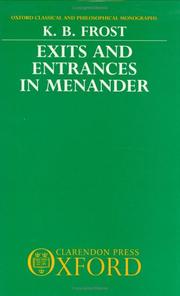
ISBN: 0198147236 9780198147237 Year: 1988 Publisher: Oxford: Oxford university press,
Abstract | Keywords | Export | Availability | Bookmark
 Loading...
Loading...Choose an application
- Reference Manager
- EndNote
- RefWorks (Direct export to RefWorks)
Menander --- Greek drama (Comedy) --- Drama --- Théâtre grec --- --Ménandre, --- Comédie --- --History and criticism --- Technique --- 875 MENANDER --- -Greek drama (Comedy) --- -Drama --- Drama, Modern --- Plays --- Stage --- Literature --- Acting --- Dialogue --- Griekse literatuur--MENANDER --- History and criticism --- Philosophy --- Menander of Athens --- -Technique --- Drama in Greek --- History and criticism. --- Technique. --- 342-292 B.C. --- Menander, --- -Griekse literatuur--MENANDER --- 875 MENANDER Griekse literatuur--MENANDER --- Closure (Rhetoric) --- Openings (Rhetoric) --- Rhetoric, Ancient --- Ancient rhetoric --- Classical languages --- Greek language --- Greek rhetoric --- Latin language --- Latin rhetoric --- Beginnings (Rhetoric) --- First lines (Rhetoric) --- Opening sentences --- Rhetoric --- Dramaturgy --- Authorship --- Playwriting --- Endings (Rhetoric) --- Last lines (Rhetoric) --- Peroration --- Menandros, --- Athens, Menander of --- Menandro, --- Ménandre, --- Menandorosu, --- מינאנדרוס --- Менандр, --- Greek drama (Comedy) - History and criticism --- Drama - Technique --- Menander - Technique --- Ménandre, 342-292 av JC --- Menander Comicus --- Menandro --- Ménandre --- Menandros
Multi
ISBN: 9780521762731 0521762731 9781139005272 9781107525832 1107525837 1139179373 1107224721 1139188968 9786613378439 1139187686 1139183052 1139005278 1283378434 113919027X 1139185373 9781139190275 9781139187688 9781283378437 Year: 2012 Publisher: Cambridge : Cambridge University Press,
Abstract | Keywords | Export | Availability | Bookmark
 Loading...
Loading...Choose an application
- Reference Manager
- EndNote
- RefWorks (Direct export to RefWorks)
Oaths were ubiquitous rituals in ancient Athenian legal, commercial, civic and international spheres. Their importance is reflected by the fact that much of surviving Greek drama features a formal oath sworn before the audience. This is the first comprehensive study of that phenomenon. The book explores how the oath can mark or structure a dramatic plot, at times compelling characters like Euripides' Hippolytus to act contrary to their best interests. It demonstrates how dramatic oaths resonate with oath rituals familiar to the Athenian audiences. Aristophanes' Lysistrata and her accomplices, for example, swear an oath that blends protocols of international treaties with priestesses' vows of sexual abstinence. By employing the principles of speech act theory, this book examines how the performative power of the dramatic oath can mirror the status quo, but also disturb categories of gender, social status and civic identity in ways that redistribute and confound social authority.
Greek drama --- Oaths in literature --- Speech acts (Linguistics) in literature. --- Théâtre grec --- Serments dans la littérature --- Actes de parole dans la littérature --- History and criticism. --- Histoire et critique --- Aeschylus --- Sophocles --- Euripides --- Aristophanes --- Oaths in literature. --- Criticism and interpretation. --- Classical Greek literature --- Literary rhetorics --- Drama --- Théâtre grec --- Serments dans la littérature --- Actes de parole dans la littérature --- Euripides. --- Sophocles. --- Aeschylus. --- Arts and Humanities --- History --- Aristofan --- Arystofanes --- Aristophane --- Aristofane --- Arisutopanesu --- Arisutofanesu --- Aristófanes --- Aristophanes Comicus --- אריסטופאנוס --- אריסטופאנס --- אריסטופאנס. כספי זיוה --- אריסטופניס --- אריסטופנס --- Ἀριστοφάνης --- Ėvripid --- Yūrībīdīs --- Euripide --- Euripedes --- Eŭripido --- Eurypides --- Euripidesu --- אוריפידס --- エウリーピデース --- Εὐριπίδης --- Sophocle --- Sófocles --- Sofoklis --- Sophoclis --- Sofokl --- Sūfūklīs --- Sofokles --- Sūtmūklīs --- Sofocle --- Sophokles --- Sofokŭl --- סופוקלס --- سوفوكليس --- Σοφοκλῆς --- Eskhil --- Eschylus --- Aischylos --- Esquilo --- Eschilo --- Aiskhilos --- Eshil --- Æskílos --- Ajschylos --- Eschil --- Esḳilos --- Eschyle --- Äschylos --- Eskili --- Aiszkhülosz --- Eschylos --- Iskilos --- Эсхил --- אייסכילוס --- איסכילאס --- איסכילוס --- إيسخولوس --- ايسخيلوس --- Αἰσχύλος
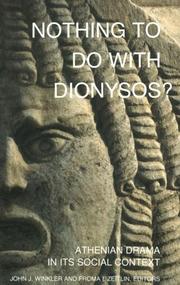
ISBN: 0691068143 0691015252 0691215898 Year: 1990 Publisher: Princeton University Press
Abstract | Keywords | Export | Availability | Bookmark
 Loading...
Loading...Choose an application
- Reference Manager
- EndNote
- RefWorks (Direct export to RefWorks)
Dionysia --- Dionysus (Greek deity) --- Greek drama --- Literature and society --- Social problems in literature --- Theater --- Orphisme --- Dionysos (Divinité grecque) --- Théâtre grec --- Littérature et société --- Problèmes sociaux dans la littérature --- Théâtre --- History and criticism --- Social aspects --- History --- Histoire et critique --- Histoire --- Athens (Greece) --- Athènes (Grèce) --- Social conditions --- In literature --- Conditions sociales --- Dans la littérature --- Dionysia. --- Dionysus (Greek deity). --- Social problems in literature. --- History and criticism. --- Dionysos (Divinité grecque) --- Théâtre grec --- Littérature et société --- Problèmes sociaux dans la littérature --- Théâtre --- Athènes (Grèce) --- Dans la littérature --- Athene in de literatuur --- Athens (Greece) in literature --- Athènes dans la littérature --- Dionysies --- Dionysus (Griekse godheid) --- Sociale problemen in de literatuur --- -Social problems in literature --- Orphic mysteries --- Orphism --- -Athens (Greece) --- -Orphic mysteries --- Cults --- Literature --- Literature and sociology --- Society and literature --- Sociology and literature --- Sociolinguistics --- Aḟiny (Greece) --- Atene (Greece) --- Atʻēnkʻ (Greece) --- Ateny (Greece) --- Athen (Greece) --- Athēna (Greece) --- Athēnai (Greece) --- Athènes (Greece) --- Athinai (Greece) --- Athīnā (Greece) --- In literature. --- Intellectual life. --- Social conditions. --- Sociology of literature --- Classical Greek literature --- Drama --- Greece --- Dionysus --- Αθήνα (Greece)
| Listing 1 - 9 of 9 |
Sort by
|

 Search
Search Feedback
Feedback About UniCat
About UniCat  Help
Help News
News